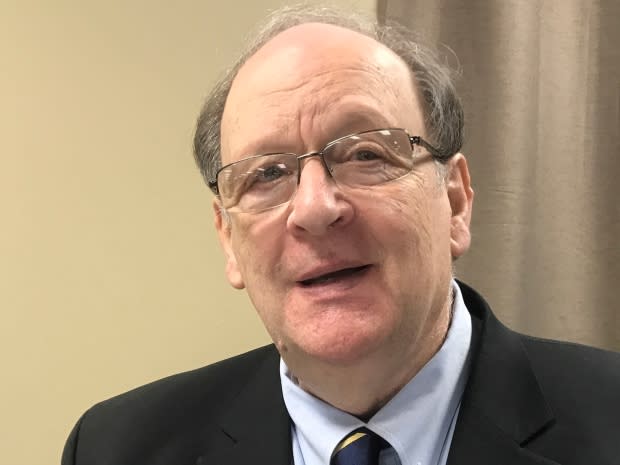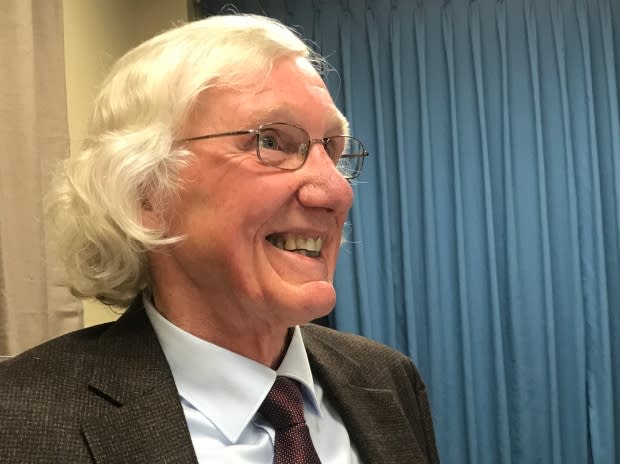Inquiry sheds light on $300M Muskrat mystery, and it's not good for bureaucrats
There's now a better understanding of the curious and complex case of a head-scratching $300-million increase to the cost of Muskrat Falls, and the circumstances are not flattering for the provincial bureaucracy.
Three former public servants testified at the inquiry that is investigating the troubled project, and there's evidence they all they knew about a $6.53-billion final forecast cost for Muskrat prior to the financing agreement being inked in late November 2013.
That's significantly higher than the $6.2-billion construction cost the project was sanctioned at a year earlier.
This higher number was never disclosed publicly because Nalcor was still negotiating contracts with bidders, according to evidence, and did not want to weaken its negotiating position.
And some very senior politicians, including then-finance minister Tom Marshall and then-natural resources minister Derrick Dalley, have testified they could not recall being told of the higher cost estimate.
Richard Leblanc asks the tough question
It's now increasingly apparent that their subordinates did not raise the alarm about a significant jump in the project cost before the province was locked into a formula that required government to fund its completion, regardless of overruns.
That placed three now-retired bureaucrats in the spotlight Monday, with the most senior among them, former deputy finance minister Donna Brewer, taking some heat from inquiry commissioner Richard LeBlanc.
LeBlanc expressed astonishment that when it was known the cost had grown by hundreds of millions, some serious debate did not unfold inside of government.
Did you or anyone in your office think it might be prudent to go to the minister and say, 'Mr. minister, this is a big increase in a very short period of time. Maybe we better have another look at this'? - Richard LeBlanc
As the most senior advisor to Marshall, LeBlanc took special aim at Brewer.
"Did you or anyone in your office think it might be prudent to go to the minister and say, 'Mr. minister, this is a big increase in a very short period of time. Maybe we better have another look at this'? Do some sort of analysis? Do something other than just accept the fact there's a $300-million increase at that stage?"
Brewer said that never happened because the increase was still within the range being proposed by Nalcor, and that then-Nalcor CEO Ed Martin said interest savings through a federal loan guarantee would offset the increase.

Even with the increase, Brewer said, Muskrat was still the least-cost option based on an assessment carried out by Nalcor.
"I don't think that panic would have set in at that stage, and the direction through the government was to get this done," said Brewer.
She said she was actually relieved the cost had only increased by $300 million at that point.
"I find it hard even as a citizen accepting that the government didn't anticipate or didn't believe there wouldn't be any cost variances on this project," she said.
No 'clear recollection'
According to evidence, Brewer was forwarded a Nalcor document by another finance official, Paul Myrden, about a week before financial close on Nov. 29, 2013.
This document clearly references a project cost of $6.53 billion, but Brewer can't recall reading it, noting she was very busy at the time preparing the province's fall fiscal update.

When asked if she had informed Tom Marshall about the increase, Brewer said she did not have a "clear recollection."
When asked by inquiry co-counsel Barry Learmonth why this additional $300 million was not "taken into account on the government books" at the time, Brewer said it's because the additional funds would not be needed until the 2014-15 budget.
"Once we knew it wasn't an issue for '13-'14, there wasn't anything to record," she said.
Indeed, the increase did not become widely known inside government until budget preparations in March 2014, and the public wasn't informed of any cost increases until Ed Martin revealed a new estimate of $6.99 billion in the summer of 2014.
The construction cost has since soared to at least $10.1 billion, though it jumps to $12.7 billion when interest during construction is included.
A he said-she said narrative
The whole situation has come up repeatedly at the inquiry, and it's evolved into a he-said-she-said narrative.
It's important because it's the first real sign the project was in trouble, and occurred before government was locked into the project.
Former premier Kathy Dunderdale has testified she knew about the $6.5-billion number, and said she "would have" told her cabinet at the time, though there's no documents to confirm her story.
But that's not consistent with the testimony of Marshall, Dalley, and another former premier, Paul Davis, who was a cabinet minister at the time of financial close.
Ed Martin, meanwhile, said he told Dunderdale and other officials during a briefing.
As for Myrden, he was challenged on why he did not raise alarm bells, but said he was not focused on the capital cost estimate.
Erin Best, the lawyer for Kathy Dunderdale, accused Myrden of having "tunnel vision," to which Myrden replied, "I did what I was asked to do, and I did it completely."

The plot only thickened when another former bureaucrat, Paul Morris, took the witness stand.
Morris was assistant deputy minister of energy policy, and a liaison between the Department of Natural Resources and Nalcor.
He knew the cost had increased, and suggested he would have notified his superior, then-assistant deputy minister Charles Bown.
But like others, Bown has testified he could not recall being told about the $6.5-billion figure, and there's no documentation to suggest he was.
"I can't say with 100 per cent certainty. There was a lot going on," Morris said.
Read more from CBC Newfoundland and Labrador


